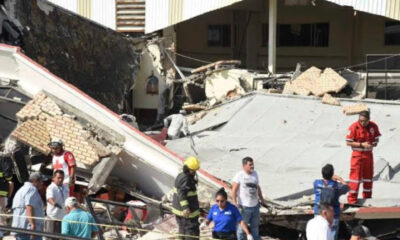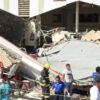The avocado, a tree likely originating from south-central Mexico, is classified as a member of the flowering plant family Lauraceae. The fruit of the plant, also called an avocado, is botanically a large berry containing a single large seed.
A convoy of vigilantes snakes along a road in western Mexico, vowing to defend their avocado orchards from gangs sowing terror in a country reeling from a new wave of bloodshed.
Armed with assault rifles and other firearms, the masked men travel between plantations and maintain checkpoints in Ario de Rosales in Michoacan state, the scene of a bloody cartel turf war.
Before they began patrolling the area, residents lived in fear of kidnapping, extortion, and theft of avocado, according to a member of the self-defense group Pueblos Unidos, which says it has 700 members.
“We need to be armed to defend ourselves,” he told AFP, speaking on condition of anonymity, wearing a badge reading “Down with injustice, no more death.”
Previously, criminals “came to do what they wanted to us, and that doesn’t happen anymore,” he added.
President Andres Manuel Lopez Obrador opposes such self-defense groups — a phenomenon that dates back to 2013 — saying that some of them have become fronts for criminals.
Such comments are not well received in Ario de Rosales, where another Pueblos Unidos member says the president should “get his shoes dirty” to discover the reality of life in the area, where the Jalisco New Generation and Los Viagras cartels operate.
The police and military “feared the criminals or were paid by them to do nothing,” said another vigilante who gave his name as Martin.
‘Hugs not bullets’
It is estimated that there are around 50 such self-defense groups in Mexico, which have seen intensifying violence in recent months, notably in Michoacan and the northern states of Tamaulipas and Zacatecas.
Mexico registered 14,243 murders in the first five months of the year, and the bloodshed has shown no sign of stopping since then.
On June 19, alleged members of the Gulf Cartel shot dead 15 people described by the government as innocent victims in the border city of Reynosa in Tamaulipas.
Four attackers were killed by the police.
One hitman who was arrested said that the massacre sought to “heat the plaza” — a form of random killings to divert the attention of the authorities away from other areas.
On June 29, nine bodies were found near Ciudad Miguel Aleman, also in Tamaulipas, where criminals are fighting for control of a border bridge used to smuggle drugs, weapons, and migrants, according to an intelligence source.
And a shootout between alleged gang members left 18 dead in Zacatecas, where the bodies of two policemen were hung from a bridge.
Despite the escalation in violence, Lopez Obrador refuses to declare war on the cartels, arguing that this policy failed in the past.
Instead, he has maintained a strategy of “hugs not bullets” and fighting crime at its roots by attacking poverty and inequality.
More than 300,000 people have been murdered since the government of then-president Felipe Calderon deployed the military in the war on drugs in 2006.
‘Power vacuums’
Since then the dominant cartels have splintered to the point that around 200 gangs now operate in the country, according to the think tank InSight Crime.
Lopez Obrador has told the United States that he wants to end military cooperation in fighting narcotics trafficking.
“You cannot confront violence with violence,” he said on Friday about the situation in Aguililla, another Michoacan town terrorized by warring gangs.
In April, former US ambassador Christopher Landau said that Lopez Obrador saw the cartels as a “distraction” from a domestic agenda mostly focused on social programs.
“So he has adopted a pretty laissez-faire attitude towards them,” said Landau, who was ex-president Donald Trump’s envoy in Mexico City.
Lopez Obrador’s policy of non-confrontation with the cartels has left “power vacuums” exploited by gangs, according to Jose Reveles, a drug trafficking specialist.
In Aguililla, residents recently attacked a garrison with homemade explosives to try to pressure the military into reopening roads that had been blocked by rival gangs.
“We were trapped in the village and getting food was very difficult,” said Eugenia, a mother of two living in the town.
Aguililla is at the center of a turf war between Carteles Unidos and Jalisco New Generation, whose leader Nemesio Oseguera was born there.
“While the government said that things were fine and there was no organized crime, we saw them daily, with high-powered weapons,” another resident who did not want to be named told AFP
“The government always looks the other way.”
Source: Guardian

































